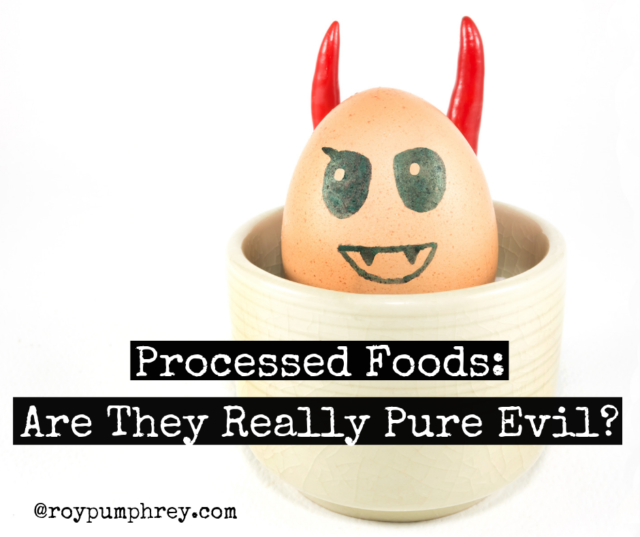
“Don’t Eat it if it Comes From a Box”
How often do we hear that these days?
What’s so bad about food from a box anyway?
Well, the nutritional zealots look at it this way:

The response usually comes down to some variation of,
“It’s Processed Food”
With headlines like these, Processed Food must be one Bad Hombre:
Highly Processed Food Linked to Earlier Death
Why Eating Processed Foods Might Make You Fat
How Processed Foods Wreak Havoc On Your Health
Could it be that we’ve finally found THE REASON 70% of Americans are overweight (this stat includes obese)?
Processed Food: Satan For All Ages
All the previous nutritional devils have fallen by the wayside,
- HFCS (high fructose corn syrup)
- Carbohydrates
- Fats
- Artificial Sweeteners
- Gluten
- Sugar
Maybe their not good guys, but all eventually all the hype faded and people realized they’re pretty benign to most people in normal dosages.
But when it comes to our weight and our health, things kept going south…
A New Hero Emerges: Paleo
Circa 2007, at the peak of the Paleo Diet and Clean Eating you started to hear the mantra,
“Only eat what you can hunt, pick or grow”
Essentially, emphasizing “whole” foods with minimal processing.
“Just Knock it’s Horns off, wipe it’s nasty old ass, and chunk it right here on this plate”- Pepper (Woody Harrelson) in The Cowboy Way explains Paleo
And a lot of people we’re really successful with this eating strategy.
Truth be told, for most people Paleo is a pretty damn good way to eat.
- Lean meats
- Fruits
- Vegetables
That’s pretty solid, unless you’re an endurance athlete and need more carbs.
Other than that, I can’t really think of a reason it’s not a winner.
So maybe it wasn’t the individual nutritional bad guy that was the problem but instead foods that put all those bad guys TOGETHER create an evil, food based, Voltron of sorts.
The type that come from a box….

The Dark Lord of Nutrition: Processed Foods
Earlier this year this study came out and it has been held up as the PROOF that processed food is pure evil.
Ultra -Processed Diets Cause Excess Calorie Intake and Weight Gain: An Inpatient Randomized Controlled Trial of Ad Libitum Food intake- Cell Metabolism
What They Did:
This study took 20 “weight stable” adults, split them in two groups, put them in a metabolic ward and gave one group the processed diet for 2 weeks, one group the whole food diet for two weeks, then flipped the groups.
Both diets were matched for
- Calories presented at each meal
- Macronutrient (protein, carbohydrate and fat) breakdown
- Sodium, sugar and fiber composition\
This is all important because people tend to eat what’s presented to them, not until they are satiated.
If the calories per meal are mismatched obviously the group getting more calories would be predisposed to weight gain.
Protein does take more energy to digest than cabs and fats, has a satiating effect and the concept of “protein leverage” seems to exist, where because protein is essential humans will consume until a minimum amount of protein is ingested.
And it’s pretty well documented in the literature that if one group is presented with a high protein diet they would see less weight and fat mass gain vs a high protein or carb diet in hypercaloric conditions.
Fun Fact: high protein diets usually result in increased fat free mass as well as fat mass lost even in isocaloric or hypercaloric conditions.
That’s right kids, people tend to gain lean mass and lose fat mass when they consume calories in excess of their daily needs so long as those excess calories (within reason) are from protein ONLY.
Food Intake Was Ad Libitum
The subjects were provided food 3 times a day ad libitum in 60 minute blocks.
This means that while the initial meals were matched for calories and macros, both groups could consume as much food as they wanted within each 60 minute feeding window.
Why Is This Study So Good?
It’s real science.
The subjects lived in a metabolic ward for the duration.
“The National Institutes of Health Clinical Center’s airtight “metabolic chamber” is furnished only with an exercise bike, a toilet, and a bed. For 23 hours in June, I was sealed in the chamber, while nurses monitored me constantly through a plexiglass window and video camera in the ceiling.
Like a prisoner in solitary confinement, I ate meals delivered through a small, air-locked opening in the wall. Since researchers were measuring every calorie I used, any leftover scrap had to be sent back through the wall and recorded. A heart monitor and three accelerometers on my wrist, waist, and ankle tracked my every heartbeat and movement.” – Vox
These chambers are the GOLD STANDARD in metabolic measurement.
If you burn it, the metabolic chamber will measure it.
No survey,
no recall, feelings
no lying about what you eat misremembering.
100% Real, Accurate, Valid, Measurement.
What Happened?
Neither group consuming the processed food diet did so hot,
“participants gained 0.9 ± 0.3 kg (p = 0.009) during the ultra-processed diet and lost 0.9 ±0.3 kg (p = 0.007) during the unprocessed diet……Body fat mass increased by 0.4 ± 0.1 kg (p = 0.0015) during the ultra-processed diet“
That’s right, eating ad libitum processed food created a roughly 2lbs increase in 2 weeks.
About 1lbs of that was PURE FAT.
Think about that for a second..
1lbs of fat in 2 weeks on the processed food diet.
If that pace would hold up (I’m guessing it would not, but for shits and giggles) that equates to 26lbs in a year of PURE FAT GAIN.
What Happened on the Whole Foods Diet?
Only good things.
“participants gained 0.9 ± 0.3 kg (p = 0.009) during the ultra-processed diet and lost 0.9 ± 0.3 kg (p = 0.007) during the unprocessed diet.…. Body fat mass increased by 0.4 ± 0.1 kg (p = 0.0015) during the ultra-processed diet and decreased by 0.3 ± 0.1 kg during the unprocessed diet (p = 0.05) (Figure 3C), whereas fat-free mass tended to increase during the ultra-processed diet (0.5 ± 0.3 kg; p = 0.09) and decrease during the unprocessed diet (0.6 ± 0.3 kg; p = 0.08″
When the groups consumed whole, or minimally processed foods they lost about 2lbs with about 1lbs of it being fat.
Essentially the outcome of the different diets was exactly opposite.
Literally, 180 degrees.
Highly processed foods lead to weight and fat gain.
Whole foods lead to weight and fat loss.
Proving Processed Food CAUSES Weight and Fat Gain
With football season just weeks away, it only seems fitting to channel my inner Lee Corso,
Remember folks this study was done with Ad Libitum intakes.
The subjects in both groups could CONSUME AS MUCH OF THE FOOD AS THEY WANTED
*within the feeding window
“metabolizable energy intake was 508 ± 106 kcal/day greater during the ultra-processed diet (p = 0.0001). ……”
Wait But What?
The ultra processed food group ATE MORE CALORIES.
There wasn’t any thermodynamic magic due to the processing of the foods.
They gained weight and fat because they ate MORE CALORIES than they burned.
“Weight changes were highly correlated with energy intake”
As usual, CALORIE CONSUMPTION determined weight gain.
The law of thermodynamics was still intact.
Still no magic foods.
What Had Happened Was:
Those on the ultra processed diets consumed more carbs and fats than those on the whole food diet,
“the increased energy intake during the ultra-processed diet resulted from consuming greater quantities of carbohydrate (280 ± 54 kcal/day; p < 0.0001) and fat (230 ± 53 kcal/day; p = 0.0004), but not protein“
One of the interesting things in this study, that lends to the protein leverage hypothesis holding water is that the absolute protein intake between groups remained stable.
It didn’t matter what diet they were on, the subjects would more or less consume their typical amount of protein each day.
“The remarkable stability of absolute protein intake between the diets, along with the slight reduction in overall protein provided in the ultra-processed versus the unprocessed diet (14% versus 15.6% of calories, respectively), suggests that the protein leverage hypothesis could partially explain the increase in energy intake with the ultra-processed diet in an attempt to maintain a constant protein intake”
But the subjects in the ultra processed group didn’t take in more protein rich foods, instead they consumed more carb and fat rich foods to make up the protein difference.
Why?
We don’t know for sure, but have an idea.
Palatability (From the Wiki):
Palatability is the hedonic reward (i.e., pleasure) provided by foods or fluids that are agreeable to the “palate”.
The ultra processed dieters may have received a higher degree of pleasure from the more palatable carbohydrate and fat rich foods so they chose them, despite their lower protein content, to achieve their protein needs.
“it is unclear why subjects chose to meet their protein targets via compensatory overeating of dietary carbohydrate and fat rather than selecting foods with high protein content. Perhaps within-meal palatability differences between foods or the composite nature of many ultra-processed foods limited the possibility for targeted consumption of higher protein foods without concomitant overeating of carbohydrate and fat during the ultra-processed diet.“
Ie. the way the processed foods are built (higher carb and fat content) combined with their palatability may have lead to the consumption of extra carbs and fats along with the needed protein.
With Palatability Typically Comes Energy Density
Sugar might not be addictive but it tastes good.
And foods with lots of it, and fat, and salt in combination sure as hell are palatable.
Thing is, those foods pack a Infinity Gauntlet sized calorie punch, being VERY calorically dense.

High caloric density combined with a lower protein content per calorie consumed, means you need to eat a lot MORE ultra processed food to actually have the same food volume in your stomach and overall meal satiation.
“The foods and beverages consumed during the ultra-processed diet had greater energy density than the unprocessed diet (1.36 ± 0.05 kcal/g versus 1.09 ± 0.02 kcal/g; p = 0.0008). While the presented ultra-processed and unprocessed meals had similar energy densities, this was due to inclusion of beverages as vehicles for the dissolved fiber supplements in the ultra-processed meals that were otherwise low in fiber. However, because beverages have limited ability to affect satiety (, the 85% higher energy density of the non-beverage foods in the ultra-processed versus unprocessed diets likely contributed to the observed excess energy intake.”
Yeah, and don’t drink your calories cause they don’t satiate you.
There’s that too.
So Processed Foods Aren’t Evil?
The simple answer is,
No, but they probably aren’t the best choice either.
Many of the foods we eat, that are really healthy are already somewhat processed before we eat them,
“a processed food is a food item that has had a series of mechanical or chemical operations performed on it to change or preserve it.
Processed foods are those that typically come in a box or bag and contain more than one item on the list of ingredients.” – Cooking Light
and food processing isn’t entirely for terrible sometimes,
“Food may be processed for a number of reasons: to prevent spoilage (allowing you to keep items in your fridge or pantry longer); to make it more convenient (pre-washed salad greens, canned beans, and frozen fruits and veggies are prime examples); to improve flavor or texture by using certain additives; and to boost vitamin or mineral content (such the nutrients added to enriched, refined grains). Food might also be processed to keep it safer, say, by killing potentially harmful pathogens. For example, nitrates are added to certain cured meats and poultry to inhibit Clostritium botulinum, a life-threatening bacteria.” – Samantha Cassetty, RD
So there is that whole not dying from what you eat thing.
The more complex answer to eating processed food is,
While you probably could formulate a diet made up of mostly processed or ultra processed foods and be perfectly healthy.
That would most likely be:
- Difficult and take some serious planning. It’s probably really hard to get enough fiber, protein, and other micronutrients which can and DO affect your health status.
- Awful, your volume of food would most likely be really low, you probably wouldn’t feel very full (satiated) and you’d have to track every damn calorie.
- Really limiting. I’m not sure you’d have a ton of choices to really get enough of the vitamins, minerals and protein you need inside your calorie allotment.
the real question is,
Why Would You Want To?
I sure as shit wouldn’t.
I’d strive for a diet that:
- Lets me eat a lot
- Easily covers all the micronutrients (vitamins, minerals)
- Limits fat gain
- Maximizes lean body mass
- Leaves me feeling generally good after I eat (lack of heart burn, bloating, etc)
- Keeps things flowing through the digestive track.
- Helps promote overall health, wellbeing, energy etc.
This is also called,
Eat Like an Adult.
Yeah, that’s pretty much a primarily whole food diet.
One that has adequate protein, fiber, vitamins, minerals, water and even phytochemicals.
Sure, the occasional Oreo’s, Mac and Cheese, or McDonalds fries is FINE.
PERFECTLY FINE.
The occasional consumption of these foods, even in grand excess (the kind of excess I excel in), will most likely have ZERO lasting affect on your health.
Remember, this study, even though its small, confirms what we all already know,
Processed Foods are easy to Overconsume
Processed food is literally formulated to increase palatability and thereby consumption.
Seriously, once you pop, you can’t stop.
If you have trouble stopping, maybe you shouldn’t start popping?
Should I Eat an Oreo or an Apple?
You already know what you should eat.
The question is,
“What outcome do you want?”
Yes, sometimes the answer is ,
“I just want something that tastes awesome”.
And that’s 100% fine.
Just realize what that food is.
Mouth Pleasure
If you want that food and can fit it within your calories?
Go for it.
It’s not going to hurt you and you wont magically gain weight.
Consume too much of it, you’re going to gain weight, most likely in the form of fat.
But its from the excess calories, not some Voodoo magic possessed by “Processed Food”.




[…] Processed food doesn’t matter and all that does for weight loss is an energy deficit. […]